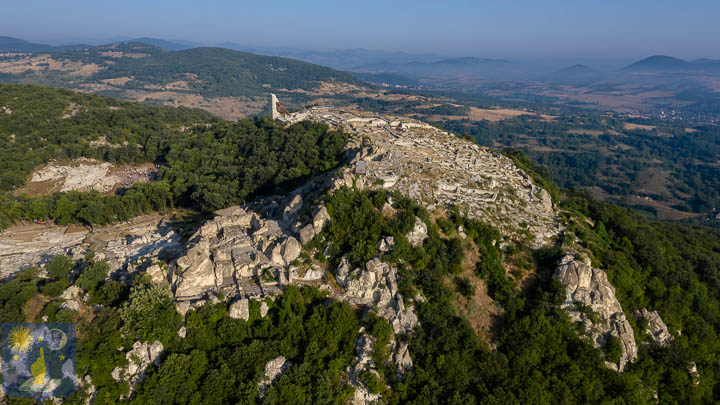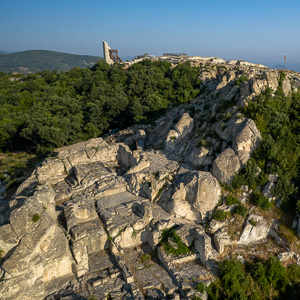The huge size and elevation of the pyramid of Perperikon makes it a central location amongst the megalithic sites of the Eastern Rhodope. The levels of the pyramid remind us of a step pyramid with a plateau and a water reservoir at its summit. The large triangular shaped megaliths and rock cut reservoirs tells us that its original construction dates back to the Lemurian epoch.

The Rhodope band of megalithic sites
Perperikon is located in the Eastern Rhodope. This step pyramid towers high above the valley where many mounds, pyramidal formations and megalithic sites are located.
The neighbouring sites
Perperikon is surrounded by smaller mounds, most of which have not yet been visited and added to the inventory. Regional sites include:
- Dolni Glavanak
- Gnyazovo
- Beli Plast
- Tatul
- Orlova Skala
Elevation
The pyramid of Perperikon towers 150m above the valley below.
Erosion
The site is heavily eroded and damaged by centuries of exploitation. The original stones of the pyramid have been broken to create areas and build walls for modern human habitation. Perperikon was inhabited until the Middle Ages.
Design of the pyramid
The Pyramid of Perperikon reminds us of the step pyramids of Mexico with its deep plateaus.
Specific rock formations
The remaining megaliths are clearly distinguishable by their angular shape with a gradient of around 50 degrees that reminds us of the Golden ration and the pyramids of Giza as well as Ostrets and Sopot.
Alignment
The rows of megaliths are lined up facing East.
The basin at the top of the plateau is lined up on a East-West axis.
Levels
There are at least 4 main levels to the pyramid of Perperikon. The plateau at the top forms the highest point where there is a stone basin 12m East-West by 5m North-South and 6m deep.
Upto the 1920s this basin used to fill up with water from an underground source. The flow was disrupted by an earthquake.
There are 3 similar stone basins on the site of Perperikon.
The size of stones
The stones of the pyramid of Perperikon are gargantuan. It points to the earliest epoch of megalith building associated with the Lemurian epoch.
The shape of the stones
The megaliths are triangular in shape. The size and shape is similar to the Lemurian and possibly early-Atlantean epochs of megalith building we witness at other sites in the Middle Mountain.
Inclination of the stones
The megaliths are inclined away from the Sun at around 20 degrees off a North-South axis.
Periods of construction
It is difficult to ascertain whether there was any later period of megalith building at Perperikon after the Lemurian epoch because later historical civilisations from the Thracians to the Middle Ages broke the stones to build walls, temples, houses and churches.
Type of stone
The stones of Perperikon seem to be made from a yellow granite.







